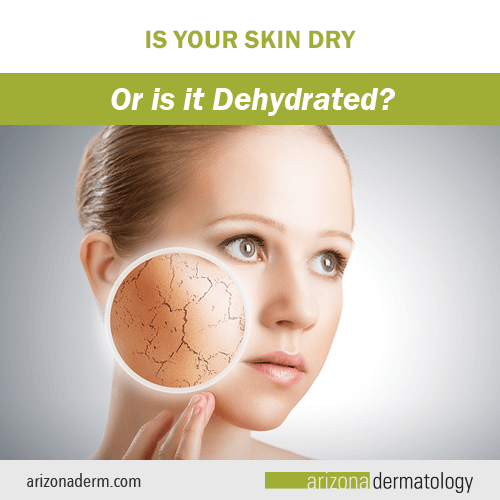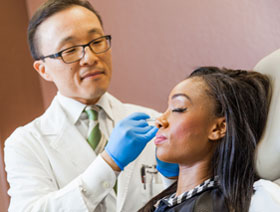 Dry and dehydrated aren’t the same thing. When it comes to your skin, there are telltale signs of each. Your skin can be both dry and dehydrated. It can even be oily and dehydrated!
Dry and dehydrated aren’t the same thing. When it comes to your skin, there are telltale signs of each. Your skin can be both dry and dehydrated. It can even be oily and dehydrated!
Today we’re going to talk about the difference between dry and dehydrated skin, how to recognize each, and what you can do to give your dry or dehydrated skin back its healthy, lustrous glow.
Dry Skin
Dry skin isn’t about water, it’s about oil. If your skin is dry it is because it lacks the natural oils, or sebum, produced by the sebaceous glands in the skin. When this happens, your skin is unable to retain its natural moisture and does not provide as effective of a barrier against microorganisms, chemicals, or pollutants.
There are a few reasons why you might have dry skin. Some people are genetically prone to it.The cooler, dryer autumn and winter weather can be a factor. Central heating in your home and even taking hot baths or showers can also be culprits.
Ingredients in your soaps and body care products can also dry your skin out. Some offending chemicals include sodium lauryl sulfate, isopropyl alcohol, and ammonium lauryl sulfate. People with HIV, kidney disease, or anorexia are also more prone to dry skin. Certain medications such as statins, diuretics, antihistamines (like Diphenhydramine, commonly sold as Benadryl), and certain acne medications (like Retin-A and Accutane) may produce dry skin as a side effect.
Signs of Dry Skin
Some signs that you might have dry skin include:
● Rough texture
● Feels dry
● Flaking
● Scaling
● Itching
● Cracking
● Redness
● “Ashy” color on darker skin tones
How to Treat Dry Skin
If you have dry skin, there are things you can do to counteract the discomfort and help restore integrity to your natural skin barrier.
● Cover up your skin when in extreme cold or other harsh weather conditions. Cover your face with a scarf and wear gloves or mittens to protect your hands.
● Shower in lukewarm rather than hot water. Limit showers to less than 15 minutes.
● Use gentle soaps and skin care products labeled for sensitive skin that have no perfumes or dyes.
● Use a quality moisturizer (we share our recommendations here), especially at night. For extremely dry hands, use moisturizer liberally at night and wear gloves to bed.
Dehydrated Skin
Dehydration of the skin is about water content. While dry skin tends to be a skin condition that can be long term, dehydration of the skin is temporary. However, dehydration can be a precursor to dry skin, so it’s best to address it right away.
What makes skin dehydrated? Lack of adequate water intake. You should be drinking at least eight full glasses of water a day, more if it’s particularly hot, dry, or you’ve been sweating. If you are a big coffee or tea drinker, you’ll need to drink extra water to counteract the diuretic effects of those beverages. Aging plays a role, too, with moisture content in our skin decreasing as we get older. If you have hard water at home, meaning the mineral content is high, that will also contribute. UV exposure will also dehydrate skin, as well as central heat and air conditioning.
No matter your skin type, your skin can lack sufficient water content and become dehydrated. That goes for oily skin as well as dry or combination skin. How can you tell if your skin is dehydrated? Let’s take a look.
Signs of dehydrated skin
One test you can do to see if your skin is dehydrated is the “pinch test.” Pinch the skin of your cheek or hand and let go. If your skin bounces back quickly, it’s well-hydrated. If the skin remains “pinched” or wrinkled or only bounces back slowly, it’s probably time to hydrate!
Look for these signs of dehydrated skin.
● Failed “pinch test”
● Visible fine lines
● Tightness
● Acne flare ups
● Sensitivity
● Dullness
● Redness or inflammation
● Dark under-eye circles
● Uneven skin tone
How to Treat Dehydrated Skin
There are some simple things you can do to treat dehydrated skin.
● Drink lots of water and maintain a healthy diet that includes foods rich in omega 3 fatty acids.
● Cut down on caffeinated beverages and alcohol.
● Don’t smoke!
● Cover up to protect skin from harsh weather conditions.
● Use sunscreen.
● Run a humidifier in your bedroom at night and in rooms where you spend a lot of time.
● Use products that have a humectant effect, like hyaluronic acid, glycerin, and aloe vera.
If your dry or dehydrated skin continues to bother you, our dermatologists or MedSpa team can help! From treatments to physician-strength products and skin care recommendations customized to your individual needs, Arizona Dermatology is here for you.


